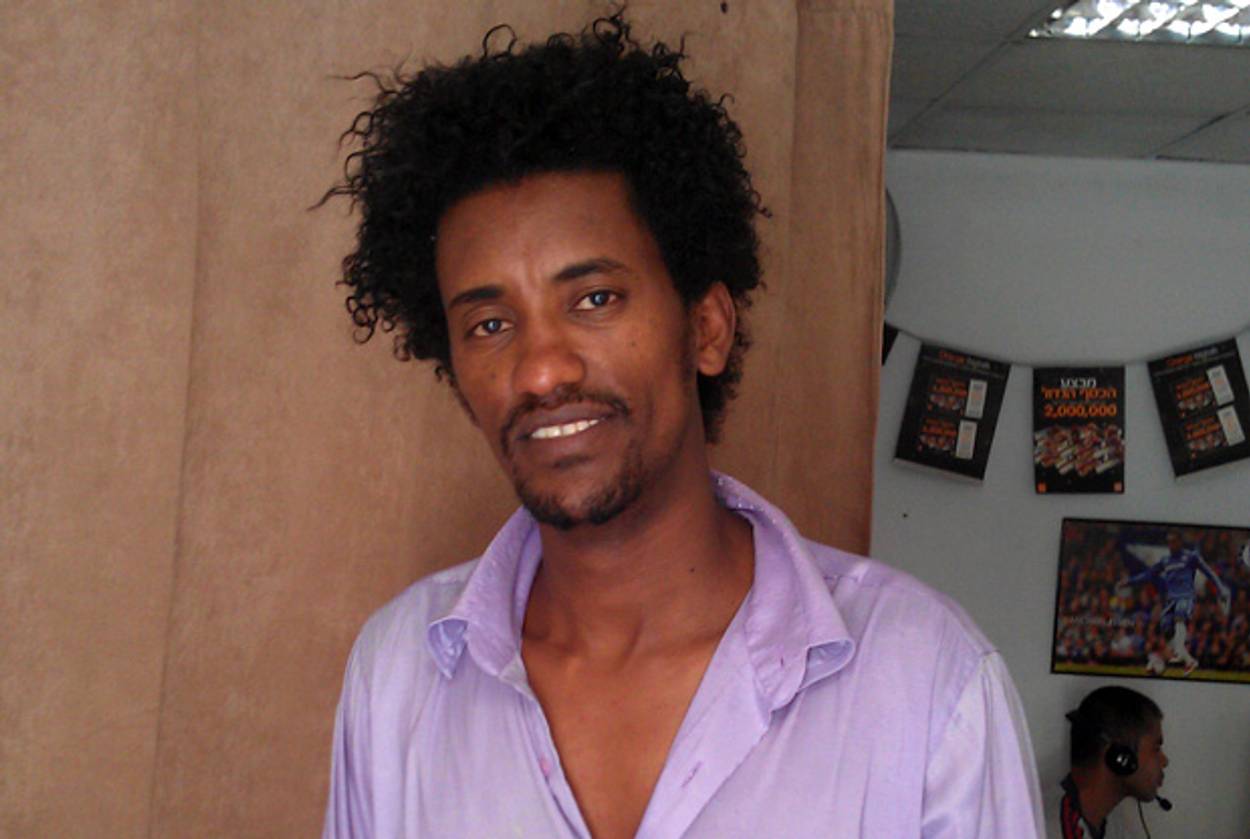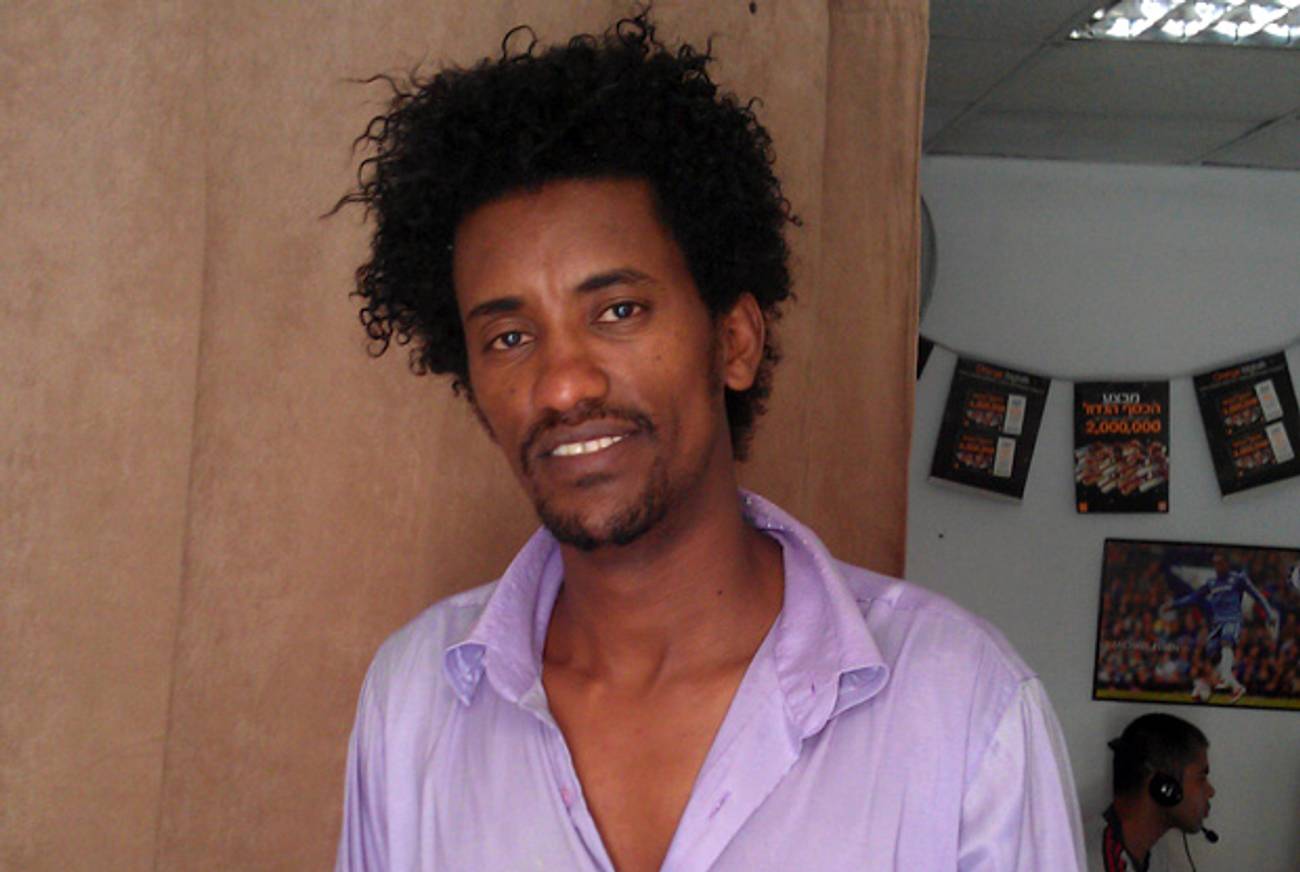Hate and the Hebrew Lesson
Days after being stabbed in a Tel Aviv café, my African student remains determined to learn the Aleph-Bet




Teaching an adult how to read and write is a little embarrassing. You wait as he stares at a letter, straining to remember its name, and guesses wrong. No, not bet—that’s an aleph, see? As he very slowly draws a symbol, and mutilates it in a way you hadn’t thought possible, you cringe. It doesn’t matter that Hebrew is his third or fourth language, or that in Eritrea, the small, troubled African nation he fled, he was an educated, practicing nurse. It’s uncomfortable to see someone stumble over your alphabet and puzzle at your elementary symbols.
Eseyas, my student, already speaks a fair amount of Hebrew, having arrived in Tel Aviv nearly five years ago. Getting here wasn’t easy. Life in Eritrea, a dictatorship with ongoing border conflicts, often demands indefinite military service for its citizens. Even as a nurse working for the government, Eseyas could not earn enough to get by. So, he left his family behind and crossed into neighboring Sudan looking for work.
At first he worked in Sudan “lifting heavy things,” which he soon found unbearable. As a Christian, he felt unwelcome in Muslim Sudan. Whenever he was asked about his religion, Eseyas would say he was was Muslim and even adopted a Muslim name, Isa, which is Arabic for Jesus. After a month in Sudan he decided to flee again. “I never expected to come to Israel,” Eseyas told me. “I had no choice.”
He paid a network of smugglers $600 to drive him to Egypt, into the Sinai Desert, and then help him cross into Israel. This is the route of tens of thousands of Africans who have entered Israel in recent years seeking work or asylum; but not everyone makes it across. The smugglers, Eseyas explained, “have no humanity.” The ones who make it to Israel bring stories of theft, rape, starvation, torture, and executions at the hands of their transporters.
When Eseyas crossed in late 2007, the operation wasn’t as dangerous as it is today. Back then, the major concern was the Egyptian soldiers. He and about 10 other Africans hid by the border until their smuggler found a gap in the Egyptian soldiers’ patrol. When they received the go-ahead they ran to the fence and helped each other climb the three meters. “As we were climbing, we heard the sound of bullets above our heads, pow pow,” Eseyas said. “Fortunately, nobody of us was hurt.” Once in Israel he was immediately detained by Israeli soldiers. After a quick pat-down for weapons or drugs, a soldier said drily, “Welcome to Israel.” A few days later he was driven to Be’er Sheva and then took a bus to Tel Aviv. He didn’t speak a word of Hebrew.
***
My journey to Israel was less of a schlep. A rabbinical student in New York, I was flown to Tel Aviv by a friendly commercial pilot who switched on the fasten-your-seat-belt light for my safety. I was looking to spend the summer volunteering and getting to know Tel Aviv, so I found myself teaching Hebrew through the African Refugee Development Center in the southern part of the city.
I met Eseyas for our first session at the Internet café he runs near the central bus station. He is 30, lanky, and his oval face seems structured downward, a somber face, so that when he smiles it inverts fantastically. He smiled and greeted me in Hebrew, explaining that he wants to learn how to read and write. After a few years, the language had become familiar but not the symbols. He hopes to have his Eritrean nursing degree recognized in Israel, for which he’ll need to pass a Hebrew proficiency test. But the Ministry of Health is unlikely to recognize his license even if he passes.
It isn’t just about Eseyas. The influx of illegal African immigrants—according to the Interior Ministry, 60,000 people have infiltrated the Jewish state in the past six years, though Tel Aviv officials believe that amount resides in the city alone—has left the Israeli government at a loss. Afraid to encourage a tidal wave of new immigrants, the government is stingy with its visas; it has granted refugee status to only a handful of people, with the rest eligible for a temporary visa that typically allows them to work but must be renewed every three months.
Africans in Tel Aviv are haphazardly arrested, and some are then haphazardly deported. According to a law that took effect in June, any “infiltrator”—the popular and official term for African refugees and immigrants who have snuck across the Egyptian border—can be detained for up to three years without a charge or a trial. While the government attempts to manage the situation, hundreds of homeless Africans sleep in the city’s parks.
In the past few months this arrangement has turned hostile. A few horrific rapes have been highly publicized. In one case, an underage Israeli couple had just left a night club when they were assaulted by three Eritrean men. The attackers beat up the boyfriend and raped the young girl while forcing her boyfriend to watch; it was 4 a.m. in south Tel Aviv on Independence Day, the girl was just 15. Following that, the headlines and public mood swung decidedly against the “infiltrators.”
Rallies with a take-back-the-neighborhood spirit popped up. At one memorable protest in the south Tel Aviv neighborhood of Hatikva, a Likud member of Knesset declared from the podium, “The Sudanese are a cancer in our body.” (For many, “the Sudanese” has become an umbrella label for all African migrants in Israel—Eritreans, Nigerians, Ghanaians, and those from the Ivory Coast.) The demonstration later devolved into racial violence and destruction of property. “Before the demonstrations I felt free,” Eseyas told me. “They smashed one guy’s teeth and his head. Anyone black they wanted to jump on. That night, I didn’t go to back to my house in Hatikva. I stayed in my Internet café and slept in my chair.”
Africans have been beaten and shot at. There has been arson as well. May saw a string of Molotov cocktails hurled at Africans in south Tel Aviv. In July, an Eritrean man and a pregnant woman were injured when their Jerusalem apartment was set ablaze. In Tel Aviv today, there is growing distrust and fear.
“I’m afraid to go to that whole area, anywhere near the central bus station,” Daniella, a twentysomething who’d been sitting next to me at a bar confessed, swinging her cigarette in an air-circle to sketch which area she meant. I met Daniella, whose complexion suggested Mizrahi ancestry, in the politically activist Florentine neighborhood, also in south Tel Aviv. I had been drinking alone, so I infiltrated the conversation of Daniella and her friend. When I mentioned my volunteer activity, we began to debate.
“I’m just afraid to walk there, even when I’m not alone. As a woman, I walk by and they touch you. They touch your arms, your ass. It’s very uncomfortable and scary,” Daniella said. “They grab you”—and she grabbed my arms with a forceful, rude touch—“they touch your chest.” (By contrast, two female volunteers I work with claim they have never even experienced a catcall.) I agreed with Daniella that harassment is a serious problem—and one that’s difficult for me to relate to as a man. But, I countered, the solution is to provide more opportunities to the city’s African community. Her solution was simpler: “Liha’if otam,” she said, using the Hebrew idiom which literally means “send them flying.”
***
If anything can make someone fly, it’s this: On July 31, at 10:30 a.m., a 34-year-old Israeli native entered Eseyas’ Internet café with a knife. He stabbed two Eritrean customers in the doorway before turning toward Eseyas and stabbing him as well. The assailant was arrested, and the victims were treated and released from the hospital. Apparently the attacker is mentally unstable with a history of psychiatric treatment.
When I heard about it on the news, I called Eseyas in disbelief. He recounted the details over the phone like a matter-of-fact reporter, speaking in English: “We had never seen him before or nothing. He stabbed one guy in his back, the other in the butt. Then he cut my hand.” Sensing my worry, he assured me he was alright.
During our conversation it occurred to me that Eseyas understood his situation far better than I did. He is, after all, a trained nurse: Wounds are precisely the symbols he recognizes. It was a wordless attack by a stranger with a blade shaped like the Hebrew letter vav, a mischievous letter that is at times a consonant and at times a vowel.
I had one question I wanted to ask Eseyas, but I held back, because I didn’t have the nerve to be trivial: Was it your right hand or your left? He continued describing what happened, with the police and the hospital, as I searched my memory for proof that he’s a righty. I couldn’t help but wonder, Will you be able to write Hebrew letters next time we meet?
When I met Eseyas again a few days afterward, I realized I had misunderstood: He was stabbed not in the hand but in his bicep, on the right side. He had flung out his arms in self defense and the attacker sliced the artery. While Eseyas tried to stop the bleeding with his other hand, the man threw a desktop computer at his legs and fled. I stared at the stitches on his arm, blue like veins, which Eseyas scratched and fingered as we spoke.
I asked if he is afraid. “Why not?” he answered. More than violent lunatics, he said, he fears being deported, given the repeated promises of the interior minister to do just that. Despite having dodged bullets and blades to stay, Eseyas imagines a life elsewhere. He dreams of going to Europe or America, a place “where there is opportunity,” and becoming a doctor. Until then, we will continue to learn the Aleph-Bet.
***
Like this article? Sign up for our Daily Digest to get Tablet Magazine’s new content in your inbox each morning.
Jesse Lempel is a rabbinical student at Yeshiva University’s Theological Seminary.
Jesse Lempel is a rabbinical student at Yeshiva University’s Theological Seminary.